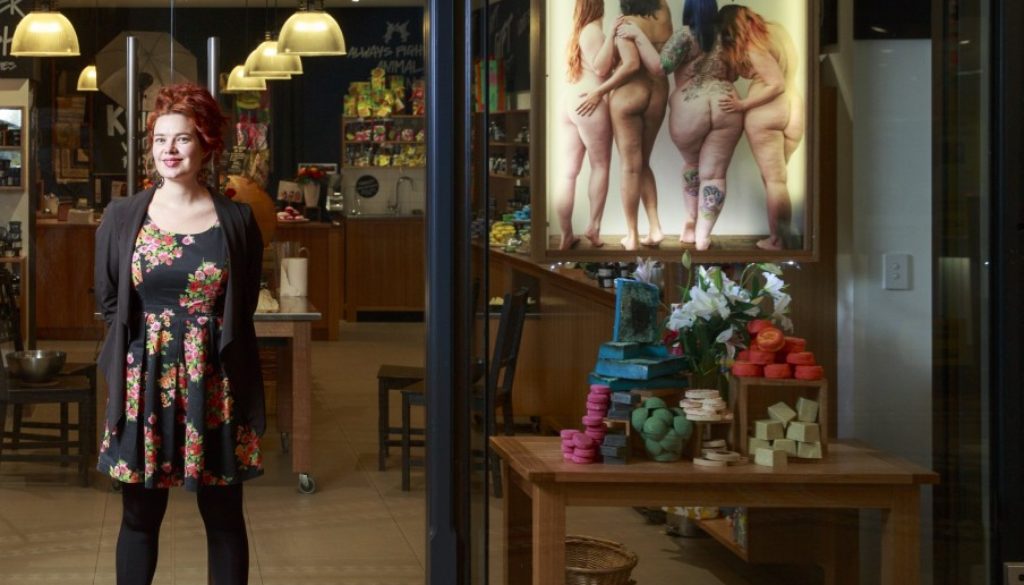Peta Granger is remaking retail
Winner of Australian retailer of the year in 2015 and an Australian Business Award for Environmental Sustainability in 2014 and 2015, Peta Granger, Director of Lush Australia and New Zealand, is using the power of commerce to create systemic change.
Lush Handmade Cosmetics uses environmentally, ethically sourced products and sustainable packaging. Under Peta’s direction, Lush has also taken part in over 50 campaigns in support of human rights, animal protection and environmental sustainability.
What is your current role with Lush and what does it involve?
I’m the Director of Lush Australia and New Zealand and started with Lush as a sales assistant on the shop floors of Dublin. After working in Europe alongside the founders for about 10 years, I moved back home to Melbourne to take up the Directorship about 5 years ago. My job is to steer the direction of the company here in AU/NZ, rally teams behind our aspirations and create a community within Lush that people want to be a part of. It’s a dream job for me and I feel very blessed to be doing something I love so much.
How is Lush different from other cosmetic companies?
We’re often called an ‘ethical company’ but I found it a bit of a difficult concept, it seems to be used to describe companies who try not to damage people or planet with their trade practices – when surely this should not be regarded as ‘ethical’ but normal business-as-usual.
We always wish to conduct our business so that all people who have contact with Lush, from our ingredients suppliers through to our staff and customers, benefit from their contact with Lush and have their lives enriched by it. We’re not perfect and we strive daily to get closer to the ideal vision that all Lush people share.
Lush places a strong emphasis on sustainable supply chains. Can you tell us a little bit about some of your most exciting and innovative products?
Lush was founded by a group of animal and environmental activists who didn’t want to leave their ethics at home when they went to work. They still run all the major parts of the business so the drive to innovate more sustainable products truly comes from the top.
Like Toothy Tabs, which are solid toothpaste tabs in recyclable packaging, they’re an alternative to nasty foil coated toothpaste tubes that all end up in landfill.
We also invented the shampoo bar which lasts for around 80 washes and replaces about 3 plastic bottles. It won a packaging design award a few years ago, for having no packaging. In 2015, we sold 4.6 million shampoo bars, saving more than 15 million bottles ending up in landfill.
We created a palm-free soap base and didn’t patent the formula it because we want other cosmetic companies to use it in striving to reduce the use of palm oil. We were using plastic glitter but after working alongside so many conversation organisations, we realised how damaging it is for our oceans and replaced it all with sparkle made from mica or seaweed. We invented this eco glitter ourselves because there was nothing like it on the market, it costs 6 times more than the plastic one but it’s a cost we think is worth it.
Packaging is a big thing in our industry where so much value is put on the weight, look and layers of useless packaging, and a lot of the time, the packaging costs more than the product inside. We constantly strive to invent products with little need for packaging and sell more than 35% of them naked, unpackaged like a greengrocer – so customers can pick up and put in paper bag or their own bag.
Lush has won awards for its sustainable practices, but it is also a strong supporter of a lot of fantastic causes, can you tell us a little bit more about the projects that Lush supports?
LUSH actively campaign on social issues we feel strongly about. A selection of the many we’ve pursued over the years include incarceration at Guantanamo Bay, bullfighting in Spain, Animal testing in cosmetics, Free West Papua, LGBTQI rights, puppy farming, excess packaging, new coal stations, the horrific treatment of asylum seekers and better protection for the Great Barrier Reef. We’ve found no adverse effects from campaigning on ethical issues like this through our shops.
One of the charities we worked with recently said to us – ‘We’ve finally figured you Lush people out, you’re actually a campaigning company who use your shops as a front.’ I guess this isn’t too far from the truth, and hope that it proves that you don’t have to leave your ethics at home if you want to run a profitable and successful company.

Lush was recently involved in some controversy with its in store advertising campaign, can you tell us more about that?
Our ‘Naked’ campaign was featured in Australian and New Zealand stores in September 2015, and sparked a little controversy and lots of passionate debate. Customers thanked us for ‘presenting real women’s bodies in a way that is so unashamed and unapologetic’.
Not all of the public felt this way and 4 official complaints were received into the Advertising Standards Board describing the images as pornographic, offensive and something they wanted to shield their children from. We welcomed the opportunity to respond to these complaints on their public website and further discuss the campaign’s message and while the ASB didn’t agree that the campaign was pornographic in nature they did uphold the complaints. This then led to it’s own publicity and the story went viral in a matter of days and saw global reach of over 10 million people, securing articles on the Mashable, Pedestrian, Buzzfeed, Huffington Post, Cosmo and many others.
These 4 women were staff members who volunteered to be a part of this shoot because they felt passionate about the issues we were focusing on. On the left is Gen from our QVB store in Sydney, next is Sabrina from Manufacturing, Claire with the tattoos is the Manager at Mt Gravatt in Brisbane and Courtney also works in QVB store. The campaign had 2 focuses – packaging free products to reduce our impact on landfill and body positivity.
These women are here in their natural form with no photo shopping, editing or enhancing. We want to tell a realistic story, share positive body images and a variety of skin and body types of everyday people. Our imagery aims to reflect and empower our customers, not make them feel awful about impossible stereotypes they’re constantly surrounded by in the beauty industry. It also created a unique open forum discussion about nakedness, it ignited conversation not just about over packaging in our industry but about deeper societal issues.
You are introducing the film Poverty Inc. Why did you choose this film and why you are supporting the Transitions Film Festival?
Poverty Inc is a powerful film about common misconceptions and mistakes we’ve made in trying to do the right thing, it’s great at guiding direction for more effective efforts. We’re so proud to be supporting Transitions Film Festival. Film is such an empowering way to make people wake up and really feel the impact of their choices which hopefully inspires change and action.
Poverty Inc. tells the story of how empowering entrepreneurs in the developing world can help eradicate poverty. Is this something that Lush is actively involved in?
We are very transparent about our where we buy from, who we buy from and the process in which the ingredients are grown. Another supply chain feature is the Sustainable Lush Fund which we call, the Slush fund. 2% of all the money we spend on purchasing packaging and ingredients is allocated into a fund which invests in small community projects that are using permaculture to grow their crops or ingredients. Permaculture is a style of companion growing rather than monoculture style growing, it aids in regenerating land and communities. The three key practices of permaculture are care for land, care for people and a fair share. With the use of permaculture, our goal is to go beyond just sustainability and move towards regeneration when sourcing our ingredients. The funding in these projects offers small communities the opportunity to create trade, business and jobs for locals.
For example; The Ghana Permaculture Institute is a bastion of permaculture practice, providing permaculture training to local farmers and opportunities to generate sustainable income. Paul, the owner, currently employs 30 people directly and reaches hundreds of farmers in the local area. He creates solutions to the problems of deforestation, the rise of expensive artificial fertilisers and pesticides while replenishing resources degraded by monoculture and mining. Initially we helped fund its start up, but we now just pay a premium price for ingredients like Moringa oil that they produced for a range of our body and face products.
Transitions Film Festival is about sharing good ideas, if you could only share one idea what would it be?
Ultimately we get to choose the kind of world we want to live in every time we open our wallets – think about the true impact of what you spend your money on and choose consciously.
What is the future going to look like in 20 years?
An ideal world in 20 years time would see us treat asylum seekers with respect and dignity, equal rights for all, sustainable and regenerative use of our resources and an end to all animal testing for cosmetic purposes. We’ve all got a lot of work to do between now and then, but I really feel that events like Transitions Film Festival help rally our efforts in the right direction.

